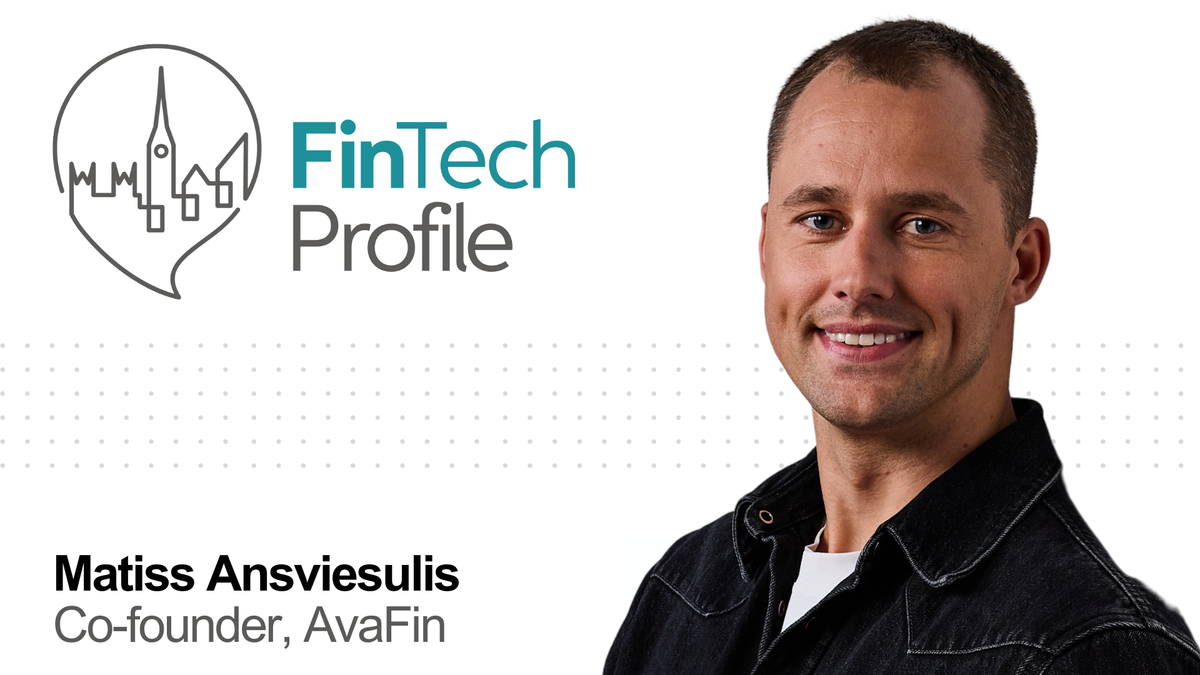Matiss Ansviesulis, Co-founder of AvaFin

Today we're meeting Matiss Ansviesulis, Co-Founder of AvaFin and a whole host of other leading FinTech players in Europe, the Middle East and Mexico.I strongly recommend you read his answer to the question, "If you had a magic wand..." I laughed out loud! Love it, Matiss! 👇 Read more...
Over to you Matiss:
Who are you and what's your background?
I’m from a small town in Latvia, where my co-founder, Davis Barons, and I grew up.
It was nothing fancy—mostly cows and a rough 90s post-USSR upbringing, with no boarding schools.
I went on to study business and finance at Lancaster University, after which I spent a year on the JPMorgan trading floor in London. During this time, Davis and I started looking for business ideas to work on and eventually came across online consumer lending. We decided to start it in Latvia.
What is your job title and what are your general responsibilities?
I’m a company builder.
Since selling my first company, AvaFin, in 2020, I’ve started multiple companies in fintech. My job is to look for new products, markets, and business models. Once that is formulated, we search for CEOs to execute the business plan. We invest equity, provide debt, and control the execution through hands-on but non-executive board management.
Can you give us an overview of your business?
Davis and I own multiple consumer lending businesses in the Middle East and Sri Lanka—online, offline, secured, unsecured loans—you name it.
Apart from Avafin, which we sold, the lending businesses will generate around EUR 50 million in annual revenue this year, with a plan to double next year.
We also own an investment platform, esketit.com, with 20,000 investors and EUR 50 million AUM; an asset tokenisation platform, fucapital.io, which has launched recently; a debt management company, spandacapital.com; and an embedded finance firm, newschool.pro, which is launching in Mexico and Saudi Arabia next year.
Tell us how you are funded?
We funded our first business through angel investors, private debt notes, a VC round, public and private bond placements, and loan marketplaces. For the businesses we’ve built since 2020, we fund them from our own equity and through our own loans marketplace, esketit.com.
What’s the origin story? Why did you start the company? To solve what problems?
Our first business was a small, short-term online loans business that we started in 2010/2011. This was after the global financial crisis, and Davis and I saw that people were struggling to access consumer credit.
We decided that nothing could be better than providing loans to consumers. We had no money ourselves, of course, and no understanding of how consumer credit works (I was an investment banker), but we decided to give it a try. Our product was quick, simple, and fully digital—this was new back then for consumer lending because most consumer loans were provided by traditional banks, and the process for getting a loan was slow and painful.
Who are your target customers? What’s your revenue model?
Currently, we have a number of consumer lending businesses, so our target customer is a consumer who needs cash. We provide a range of lending products, up to EUR 10,000 for 60 months. Our other line of business is investment platforms: esketit.com, fucapital.io, and spandacapital.com. Our customer base there consists of EU retail investors who want to earn 10-15% APR in passive income. Finally, our tech business, newschool.pro, provides lending as a service to B2B customers who want to offer loans to their clients but don’t want to manage the process themselves (including gig economy companies, payment providers, telcos, etc.).
If you had a magic wand, what one thing would you change in the banking and/or FinTech sector?
I would make lending company and fintech company valuations as high as AI startup valuations so I could sell my companies for billions.
What is your message for the larger players in the Financial Services marketplace?
We’ve had a great partnership with Capitec, the biggest retail bank in South Africa. Capitec acquired our first company, Avafin, over a 5-year period. We worked with the CEO, CFO, and other top management members there.
Apart from learning a great deal from them about credit risk management, decision-making, and board management, we understood that it’s very important to keep heavily regulated banking businesses separate from fast-moving, growth-oriented fintech businesses.
These partnerships work when the fintech is free to operate independently, so my message to big execs is: when you work with smaller fintechs, don’t tie them into your corporate processes too deeply.
Where do you get your Financial Services/FinTech industry news from?
Fintech News Middle East, The Financial Times, and specialised fintech investment banking newsletters.
What FinTech services (and/or apps) do you personally use?
Revolut, Binance, Paysera, Nexo, Crowdcube, Mintos and Verifo.
What’s the best new FinTech product or service you’ve seen recently?
Verifo - a great and convenient payment institution - visit them at https://verifo.com/
Finally, let's talk predictions. What trends do you think are going to define the next few years in the FinTech sector?
I assume BTC and other dominant cryptocurrencies will become more entrenched as value storage tools. I’d also like to see real-world asset tokenisation grow, making alternative assets (such as energy and real estate) more accessible to retail investors.
Thank you so much for taking the time to participate, Matiss.
You can find out more about Matiss Ansviesulis on LinkedIn and read more about his company AvaFin at http://www.avafin.com.
Thanks for reading, I'll be back shortly with another FinTech founder profile!
Ewan




